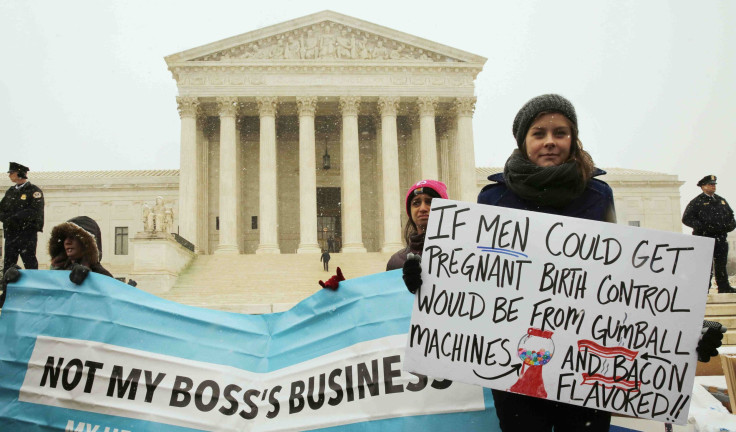Hobby Lobby Obamacare Case: Religious Battle Rages Outside As Supreme Court Debates Letting Businesses Opt Out Of Birth Control Mandate

The U.S. Supreme Court appears to have no clear consensus in a divisive case that pits religious freedom against reproductive rights, asking whether employers can opt out of providing health insurance covering birth control if they have religious objections.
According to Reuters, the Supreme Court began its hearing Tuesday with a 90-minute oral argument as attorneys for arts-and-crafts chain Hobby Lobby and furniture manufacturer Conestoga Wood Specialties asked the court to strike down a mandate in the Affordable Care Act requiring employers to provide insurance that covers birth control. Hobby Lobby says the mandate violates its religious freedom by requiring insurance that covers emergency "morning-after" contraception, which it sees as tantamount to abortion.
As the SCOTUS blog notes, the justices' comments in the combined Sebelius v. Hobby Lobby Stores and Conestoga Wood Specialties v. Sebelius fell along predictable lines: four conservative judges favored the position of Hobby Lobby while four liberal judges sided against the store. (Kathleen Sebelius is the federal secretary of health and human services.) Justice Anthony M. Kennedy, the court's perennial swing vote, appeared to be the only one on the fence as he conceded points to both sides during the debate.
For most conservative judges, the issue came down to religious freedom: even as a secular, for-profit business, Hobby Lobby should be allowed to object to the mandate on religious grounds, Chief Justice John Roberts argued.
Hobby Lobby pointed out that it does not object to offering insurance that covers several forms of birth control, but that emergency contraceptives like Plan B run counter to its principles. Both Hobby Lobby and Conestoga object to any form of birth control that may take effect after an egg is fertilized. The companies directly linked the birth control mandate to abortion, a point that Kennedy took up.
“Under your view, for-profit corporations can be forced to pay for abortion. Your reasoning would permit that,” Kennedy told Solicitor General Donald Verrilli Jr., who was arguing for the government. “You say that for-profit corporations have no standing to litigate what their shareholders believed.”
Liberal justices, however, remained unconvinced that Hobby Lobby and others have such an ability to opt out. Justices Elena Kagan and Sonia Sotomayor argued that conceding to Hobby Lobby would create a slippery slope letting employers cite religious objection to all manner of health services such as vaccinations and blood transfusions.
Kennedy, still unconvinced of either side, also chimed in to ask if employers’ religious beliefs automatically trump those of their workers, who may not agree.
Though the arguments inside the court are just getting started, the most heated debate is taking place on the steps of the courthouse. Christian groups supporting Hobby Lobby took to prayer outside the building with signs reading “God’s law comes first. Repeal socialist Obamacare” and “Stand up for religious freedom.” Counter-protesters from the Secular Coalition for America and Catholics for Choice held up signs reading “If men could get pregnant, birth control would be from gumball machines and bacon flavored.”
A Supreme Court ruling on the case is expected in June.
© Copyright IBTimes 2025. All rights reserved.






















